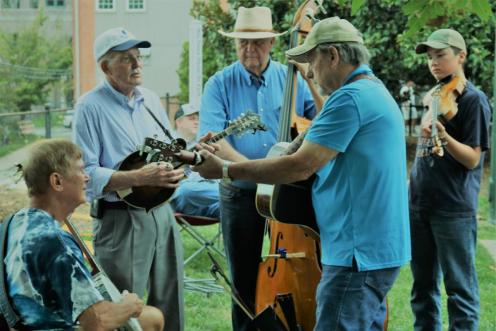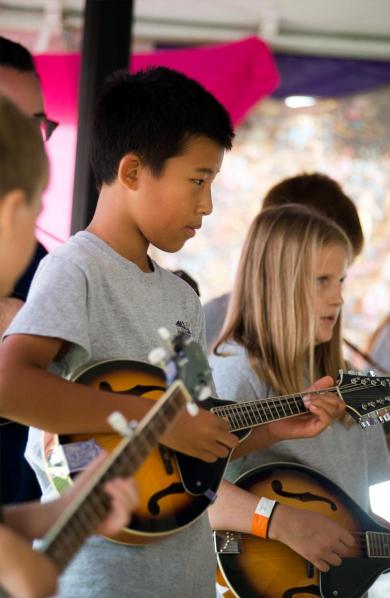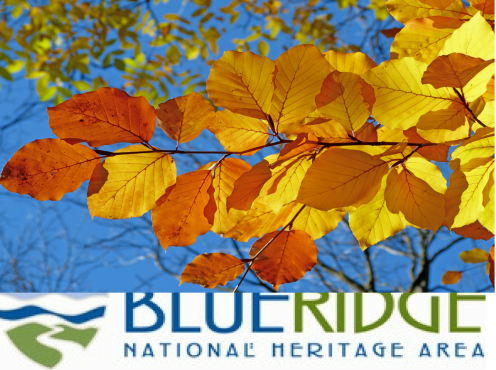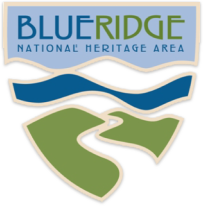
Who We Are And What We Do
Here in the Blue Ridge Mountains of North Carolina, we live in an amazing place with a homegrown culture we want to protect and share with travelers and our local citizens.
In an increasingly global and generic society, folks are yearning to find authentic links to a common pioneer past and ancient, indigenous ways. They discover new twists on old traditions in the music, craft and food of the Southern Appalachians.
Heritage is not a nostalgic pining for a lost simpler time but an appreciation for the living traditions that honor past generations and encourage new generations to explore music, craft, food, natural wonders and native wisdom, all of which have deep roots in the Blue Ridge mountains of Western North Carolina.
At the Blue Ridge National Heritage Area, we are making new investments in rural communities to attract the knowledgable cultural heritage traveler who seeks not just an escape from the commonpace, but a richer emotional connection to a real place.
Why Heritage Matters
The Blue Ridge National Heritage Area is the only regional organization solely dedicated to the stewardship of five heritage legacies woven through Western North Carolina’s distinctive Southern Appalachian culture.
Traditional Mountain Music – Fiddlers and banjo pickers jamming on front porches.
 Teams of cloggers, young and old, dancing up a storm. The faithful singing from hymnbooks with shaped notes. Follow the Blue Ridge Music Trails into the heartland of American music. Western North Carolina is home to old-time string bands, to high octane of modern bluegrass and ancient ballads still sung as they were centuries ago.
Teams of cloggers, young and old, dancing up a storm. The faithful singing from hymnbooks with shaped notes. Follow the Blue Ridge Music Trails into the heartland of American music. Western North Carolina is home to old-time string bands, to high octane of modern bluegrass and ancient ballads still sung as they were centuries ago.
- Handmade Mountain Craft The North Carolina mountains and foothills have become the geographic center of handmade crafts in the United States. The region fostered the country’s traditional craft movement in the 1800s to early 1900s) as well as the contemporary Craft Revival in the 1940s. Today, over 4,000 craftspeople live and work in Western North Carolina, where the traditional and contemporary crafts flourish side by side, and create a craft economy of more than $206 million in the region.
- Our Great Outdoors
From high, windy, boreal forests to protected gorges which harbor subtropical species, the Blue Ridge mountains and foothills of North Carolina sustain some of the greatest biodiversity in North America. We are home to the highest mountain peak in the eastern United States (Mount Mitchell), the two oldest rivers in the world – the New River and the French Broad River, and Linville Gorge, the deepest gorge east of the Grand Canyon.
- Foodways, Agriculture Western North Carolina is home to family farms and restaurants featured the best in farm-to-table produce and local meats. Visitors can experience for themselves tours of working farms, orchards, and vineyards as well as historic farm sites and museums.
- Cherokee Heritage The Cherokees have a 10,000-year history within their homeland in the Blue Ridge Mountains. The tribe’s reach once extended across the region into Kentucky and Ohio and down into South Carolina and Georgia before European settlers pierced their protective mountains. A remnant of the tribe remained despite the Trail of Tears that forced the removal of most Southeastern Indians to Oklahoma around 1838. Today, the Eastern Band of Cherokee Indians are a sovereign nation with some 16,000 enrolled members, many living on the Qualla Boundary.
Preserving Living Traditions, Aiming for the Future
While we are authorized by Congress, the Blue Ridge National Heritage Area is a homegrown idea in a region that’s prided itself on both fierce independence and grassroots cooperation. Lone pioneers did not thrive unless they banded together with neighbors to build their communities. We work hand-in-hand with our regional partners, seeding investments in innovative projects that bring new growth to our deeply-rooted communities.
Contact
Dale Neal, Digital Communications Manager
828-298-5330 ext. 308



